- Home
- Perry Rhodan
The Fleet of the Springers Page 6
The Fleet of the Springers Read online
Page 6
Hifield followed Tiff's course with narrowed eyes. "The equator is probably where it is darker," he remarked.
"Thank you!" Tiff answered with irritation. "I've noticed that myself." Then he instantly regretted his petulant reply. His nerves had been strained to the breaking point.
"Why don't you head for it?" Hifield challenged him. "It's probably less cold near the equator."
"I can't," Tiff rejoined. "If I make another turn I won't have enough energy left to make a decent landing."
Hifield was burned up. "Why didn't you think of that before, you fool? Now we'll have to freeze because of you.
Before Tiff had time to reply Eberhardt growled: "Shut your mouth, Hifield, or I'll shut it for you!" He said it so irately that Hifield pulled in his horns.
Tiff was more amused than angered by Hifield's outburst. It only proved that Hifield had reached the end of his rope just like himself. As a trained cadet he was perfectly able to figure out that without instruments it was well nigh impossible to fix the equatorial plane of a strange planet in time for an aerodynamic landing.
On the first braking ellipse Tiff dipped dangerously deep into the atmosphere of the alien world. The outside thermometer, which was still intact since it didn't require any energy, climbed up to 7200° F. But the Arkon steel retained its rigidity and even the emergency climate control managed to keep the temperature in the cockpit from rising more than four degrees.
The velocity of the destroyer, reduced to five miles per second in the initial landing approach manoeuvre, was now cut in half. The craft shot out again from the icy atmospheric shroud, gained altitude and after reaching its zenith dived again into the atmosphere.
"Watch it!" Tiff called out. "We're about to brake again!"
• • •
"Some of you," Rhodan said thoughtfully looking down at the floor—the safe floor of the command center in the Stardust—"will already have guessed my plans. However, as our present situation no longer permits guess work, I now want to give you more detailed explanations."
His listeners were the officers of the Stardust, Terra and Solar System— including the mutants—and the two Arkonides Khrest and Thora. Khrest, still exhausted from his narrow escape, and Thora with raised eyebrows and supercilious expression.
"Recently we've learned that alien intelligent beings have shown an interest in us," Rhodan continued. "It was determined that they landed on Venus and sent their agents forth on Earth. They operated so skilfully that we were unable to catch them on Terra or Venus. Moreover they seemed to be such excellent space travelers that we had to draw the inference that we were dealing with a race that was at least technically our equal.
"We also were forced to conclude that they were hostile to us. Otherwise they would somehow or other have established relations with us. This assumption became a certainty when they captured the K-7."
He looked around to see if anybody already anticipated his conclusions.
"In order to protect ourselves," he resumed, "we needed to know first of all who are enemies were. The unknown strangers were careful not to betray themselves and consequently we were obliged to take some measures to discover their secret.
"Cadet Julian Tifflor, who is well known to all of you, was the man chosen to uncover the existence of our adversaries. We implanted a cell-transmitter in his body that turned him into a sort of telepathic beacon. Our telepaths are now able to locate his whereabouts as far away as two light-years.
"We exposed Tifflor with a calculated risk and our ruse worked. The aliens got on Tifflor's track—but in a manner that we came to regret. We had not foreseen that the strangers would be able to harness our ship to their own, as happened in the case of the K-7, and to perform a hyperjump together.
"Well, you all know the trouble we had to find his track again. When we found it eventually, we were thrust into a mess which you have witnessed yourselves.
"The result? We now know who our opponents are. They belong to a branch of the Arkonide race that has not always lived in complete harmony with the Arkonides themselves. They call themselves Springers. I'll release some information about them which will be helpful to you. just let me mention a few of the more important features:
"The Springers are people with a technology that compares favorably with that of the Arkonides. Since we're utilizing Arkonide technology ourselves, they must be considered equal to us, to say the least."
"You've experienced how we almost fell into the gravity time-bomb trap they laid for us."
"All the information which was available to the Arkonide civilization is at our disposal. Yet we don't know at this time what the Springers conspire to do on Earth. We don't even know how many of the Springers, whose race numbers 10 billion people, are taking part in these aggressive actions."
"Thus it'll be necessary for us to collect more information and to get to the bottom of their intentions."
"You're aware that my agent Tifflor fled with a destroyer from the damaged K-7 in the company of two other cadets and two girls from the Space Academy but you don't know that they've been sighted by the Stardust and that two Springer ships pursued and fought a battle with them.
"I admit that I have taken a chance with Tifflor's life by with-holding the report of his detection. I wanted to prevent you from rushing to his aid and thereby ruining my plans, just as I've preferred not to help him myself when he was in trouble.
"My reasoning proved to be justified when Tifflor eliminated his pursuers in the clash. Unfortunately his ship suffered some damage in the fight. Meanwhile his ship has moved out of the range of the Stardust's sensors. Moreover, Tifflor's hypercom seems to have been partially or completely knocked out. However it is beyond doubt that he'll pass fairly close by the second planet of the system or has already reached it. I hope he'll be able to land on it.
"Our astronomical department has ascertained that the dual suns Beta-Albireo are circled by four satellites. They follow an eccentric and complicated path characteristic for twin systems. The planet to which Tifflor has steered is more than 600 million miles from the center of gravity of the system. It is certain that living conditions are quite unfavorable there.
"However, we want to provide Tifflor with the necessary supplies and make his whereabouts known to the public so that he'll soon be found."
A murmur ran through the rows of amazed and puzzled officers. Rhodan smiled and continued: "Let me point out something to you, gentlemen. The gravitation field produced by the two time-bombs had, according to our measurements, a very limited time-gradient. This implies that the bombs had been set to pin down our search teams on board the wrecks. If there had been any intention of killing them, the time-gradient would have been much greater.
"The simple conclusion we must draw from this is that we must expect the return of the Springer fleet in the near future and we can bet on it that they'll come back with considerable reinforcements.
"We'll not join battle with them. You remember what I told you about the technological accomplishments of the Springers. In a massive attack the Springers would probably defeat our three ships. The Springers have now learned that they've got a super-spaceship to combat and they'll come prepared for it.
"The Springers are bound to pay close attention to Tifflor and—hopefully—he will be in a position to collect some valuable intelligence. As to ourselves, gentlemen, we'll have some other business to take care of. I'll inform you about it at the earliest salient opportunity.
"Now that I've brought you up to date..." Rhodan interrupted himself, looked around and smiled. "I almost forgot something important. You are familiar with Major Deringhouse's report according to which—up to a few hours ago—the K-7 has been restrained by magneto-mechanical bonds to the Springer ship Orla XI that latched onto it near Pluto's orbit.
"The same Orla XI quietly sneaked out of the system when the skirmish began. We're safe to assume that the Orla XI will be first to know where Tifflor, whom they consider a very important person, i
s hiding out. This will assure Tifflor's reestablishing his contact."
He dismissed his officers with a nod. They left somewhat bewildered. Only Reginald Bell and the two Arkonides remained. Bell stood before Rhodan and eyed him with grave respect. His entire reaction was encapsulated in two words: "Wonder Worker!"
• • •
After braking for the fifth time the machine stopped bouncing out of the frigid atmosphere of the inhospitable world. The velocity of the destroyer was still pegged at Mach 5—much too high to permit a true reading of the atmosphere's temperature by the outside thermometer.
The white expanse below the craft furnished no reference points for estimating distances. Prior to his deceleration Tiff thought he could see that the planet was comparable in size to Terra, perhaps a little smaller.
Now he was afraid that his speed was not sufficient to circle around the polar zone of the planet without more thrust. He wanted to tell Eberhardt to look for a suitable landing place but what good would it do to find one if he was unable to set down his ship? He had to let his velocity run itself down gradually.
Mach 5; Mach 4.5; Mach 4...
"Is there enough power left for braking?" Hifield suddenly asked.
His voice sounded strained. Now that things became deadly serious he appeared to fear so much for his life that he forgot about quarreling with Tiff.
"I brake at half the speed of sound," Tiff answered dryly.
Hifield gasped in horror. "The atmosphere will support us only to Mach 1; then we'll sag through!"
He was right. The fins of the destroyer were only designed as steering aids at speeds higher than Mach 1 in atmospheres at least as dense as on Earth. In this respect they could not be regarded as lifting bodies. By design the craft was constructed to stay in the air by the force of its thrust which was effective in all directions as long as the machine was undamaged.
Tiff only could mutter: "Then we'll have to take a dive!"
Hifield started to protest. Tiff was little inclined, nor did he have the time, to engage in discussions. Eberhardt obviously felt the same way and barked at Hifield: "Why don't you shut up?"
Hifield shut.
The destroyer continued on its path. Mach 3... Mach 2.5...
"Are we falling to our death?" Felicita asked with trembling voice.
And Tiff—regretting it later very much—couldn't think of anything else to say than: "Of course! In two minutes!"
Felicita began to sob again.
At the end of two minutes, the ship had reduced its speed to Mach 0.6.
"Eberhardt!" Tiff called. "Do you see a place to touch down?"
Eberhardt looked at the side-view observation screen. "Yes, a vast place," he replied. "The whole planet is one big landing place. The question is what it looks like when we get lower."
He was correct. The white surface showed no contours smaller than a medium-sized bill. The craft still moved along at an altitude of 10,000 feet.
But now it sank rapidly.
"I'm going to land now!" Tiff warned.
He had no other choice left.
A few seconds later the ship had lost enough height for him to recognize bow rough the terrain actually was. Tiff hoped that the unevenness was caused by nothing worse than snowdrifts. If there was solid rock underneath, then—
Better not think about it!
The destroyer was designed for vertical landing. It was not equipped with landing wheels and they would have done little good under the prevailing conditions.
"Hold tight!"
Numerous little molehills!
"Watch out! Now...!"
There was a grinding and crunching jolt. Tiff had clasped his hands so tightly around the joystick that his wrists almost broke. With a painfully distorted face he pulled the stick back and poured on the last remnant of energy for the brake jets. They felt a second jolt when the machine hurtled across one of the molehills. For a moment swirling masses of snow blocked out the view on the observation screen; then the screen stopped functioning altogether. And so did the light. It became dark in the narrow cockpit.
The ship had not yet come to rest. For awhile it seemed to turn around its axis and it also had some forward momentum left. Finally there was a loud crash, the ear-piercing sound of tearing metal—then all was quiet. Tiff hung akimbo in his harness. He sat up and looked around. There was only complete and impenetrable darkness around him. He heard hard breathing on the helmet radio. "Here we are!" he announced.
5/ Iceworld Surprise
It soon was absolutely clear that the machine was a total loss. It was impossible to open the cockpit in the normal manner. Felicita was knocked unconscious. Eberhardt checked her spacesuit to make certain that it was properly closed.
Then Hifield and Tiff tried to force open the canopy of the cockpit. They finally succeeded and the roof slid back with noisy screeching. In the moist warm air in the cabin the faceplates of their helmets became coated with a thin sheet of ice from one second to the next.
"Turn on your thermal controls!" Tiff ordered.
He waited till the warmth of his spacesuit had reached the helmet and thawed out the covering of ice. Then he pulled himself up and climbed out of the cockpit. Hifield was about to follow him but Tiff snapped at him: "Wait!"
Hifield obeyed. Tiff sat for awhile athwart the rim of the cockpit and tried to figure out what was so peculiar about the surroundings. The gravitation! It was as simple as that. It was at least 20% less than on Earth, about 0.8 G. Tiff jumped down and sank up to his knees in powdery snow.
Suddenly he was hit with a shock by the realization of how foolhardy he had behaved. The loose snow could have been 50 feet deep and he would have gone down like a rock in water. He took a deep breath and looked around. A weak wind, which was audible through the outside mike, lazily blew misty clouds of snow across the land. Tiff looked at his right wrist to read the thermometer. He was flabbergasted when it showed minus 170° F. How long could the spacesuits regulate the temperature?
Cautiously he trudged around the destroyer and inspected the damage. Eberhardt called from inside: "What does the ship look like?"
Tiff replied with a bitter smile: "It doesn't look like a destroyer—it looks destroyed!"
The worth of the machine had been reduced to that of scrap metal. A rocky outcropping had split its underside open from the middle to the engine at the rear. If the rock had slashed it in front it would have been a tragedy for the five in the cockpit. The jets were no longer visible. Ripped and twisted metaloplastic covered the apertures.
It would soon be all over unless Rhodan came to their rescue. Life couldn't go on for long in this desolate waste of ice and snow once the energy reserves of their spacesuits and the emergency rations in the cabins were used up. If Rhodan didn't come and if they found no civilization on this planet...
Tiff laughed at the latter. A civilization in a world like this! If there ever had been life on this planet, it must have become extinct when it moved so far away from the two suns that its mean temperature sank below tolerable limits.
The two suns...
Tiff glanced at the milky sky. The light was dim but much brighter than it should have been in Tiffs opinion.
He saw one of the suns as a brilliant speck of light through the veils of drifting snow. The other was a dull, hardly noticeable red spot. Horizontally his view was restricted by the snow to approximately 300 feet. Within this radius the terrain was level except for a few little molehills.
Tiff wanted to find a cave that could be made airtight and fixed up so that they could take off their spacesuits. Although they carried emergency rations of concentrated food in their helmets, which could be released from the outside by the push of a button and then ingested, the ration sufficed only for 500 hours. During that time—such, was the idea behind this arrangement—it should be possible for the stranded spaceman to find some protected haven. Tiff was dubious that it could be accomplished.
"Come on out!" Tiff called t
o the four in the cabin. "Jump down carefully! The snow is loose and deep."
They came down together with Felicita, who had waked up in the meantime. Tiff looked at her attentively. She noticed it and lowered her eyes. "I'm sorry," she apologized softly "that I've behaved so childishly."
Tiff gently patted her on the shoulder. "Forget it, Felicita!"
They plodded aimlessly and despondent through the subpolar surroundings. Tiff was the only one to use his time purposefully from the beginning. He checked the compass on his wrist and determined that it always indicated the same direction from every position. The magnetic field of the planet was just as dependable as on Earth.
After half an hour Tiff suggested that the robot should now be released from his prison. He had little hope that the robot had fared better than the destroyer and he was very anxious to find out what his condition was. The little storage room where the robot was held had to be opened from the outside. As they had expected, the locking mechanism had indeed become inoperable.
They were lucky that they managed to open the batch and that the inclined rolling band on which the robot rested was still intact. He slid down on the rollers under his own weight after the wedge under his feet was removed. He struck the floor with a hard blow and the pressure exerted on a certain spot in his soles awakened the robot from his rigid state.
Tiff and the two cadets stared in wide-eyed amazement as the seemingly clumsy machine jumped nimbly to its feet and turned around to face them. There really was nothing unusual about this except the fact that the robot had not become defective from the various accidents which had befallen the destroyer.
In the normal manner the machine reported acoustically over its built-in ultra-shortwave transmitter: "Robot RB-013 ready for action. Operating control positive. I request assignment."
RB-013 spoke English. It was a simple routine to program an Arkonide robot for English and other languages. The data bank of his small positronic brain required only five to eight per thousand of its capacity for each language.

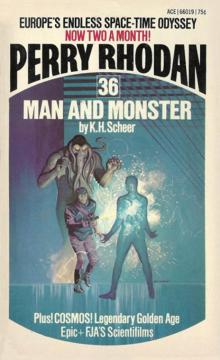 Man and Monster
Man and Monster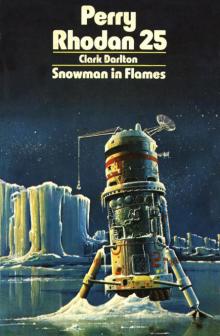 Snowman in Flames
Snowman in Flames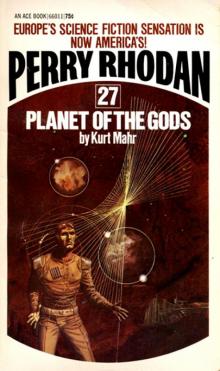 Planet of the Gods
Planet of the Gods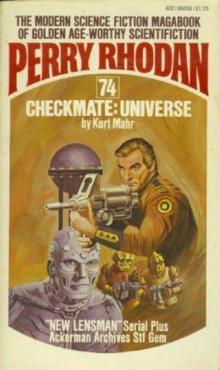 Checkmate Universe
Checkmate Universe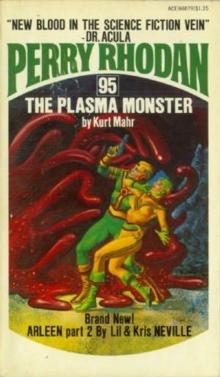 The Plasma Monster
The Plasma Monster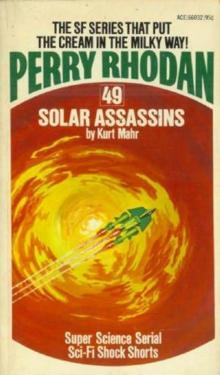 Solar Assassins
Solar Assassins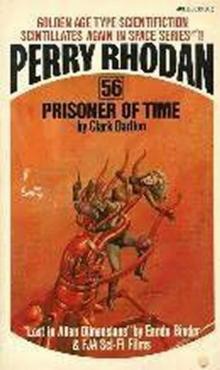 Prisoner of Time
Prisoner of Time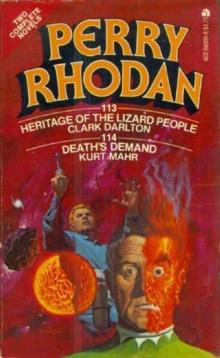 Death's Demand
Death's Demand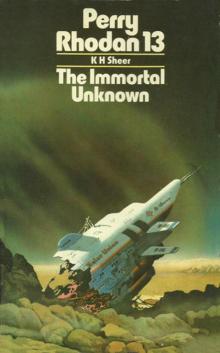 The Immortal Unknown
The Immortal Unknown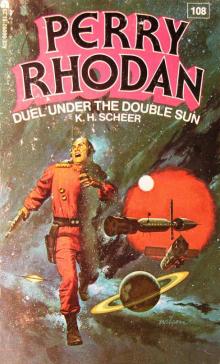 Duel Under the Double Sun
Duel Under the Double Sun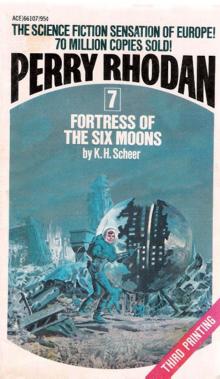 Fortress of the Six Moons
Fortress of the Six Moons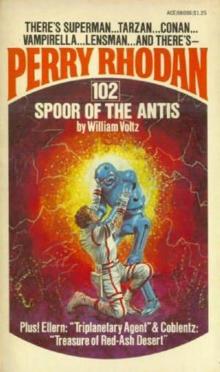 Spoor of the Antis
Spoor of the Antis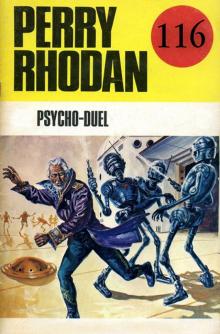 The Psycho-Duel
The Psycho-Duel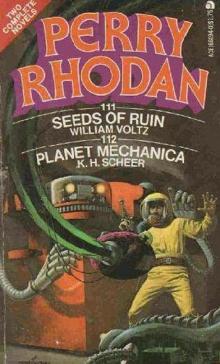 Planet Mechanica
Planet Mechanica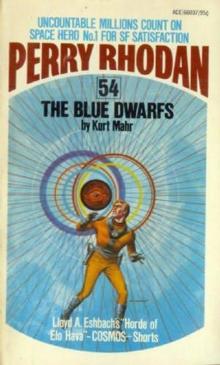 The Blue Dwarfs
The Blue Dwarfs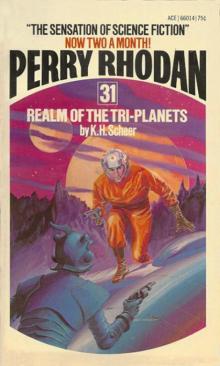 Realm of the Tri-Planets
Realm of the Tri-Planets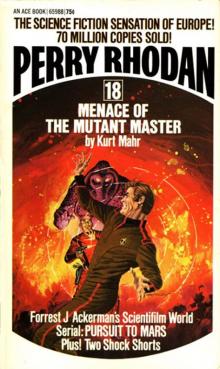 Menace of the Mutant Master
Menace of the Mutant Master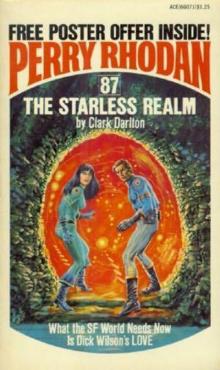 The Starless Realm
The Starless Realm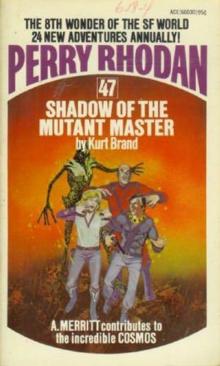 Shadow of the Mutant Master
Shadow of the Mutant Master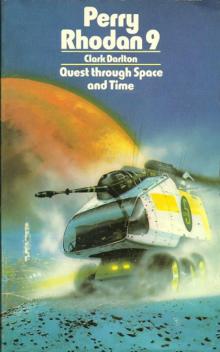 Quest Through Space And Time
Quest Through Space And Time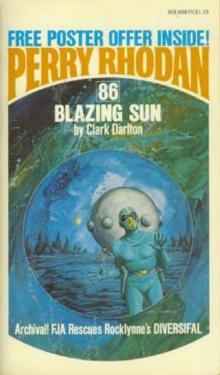 Blazing Sun
Blazing Sun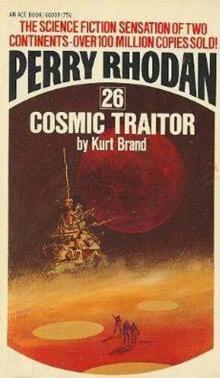 Cosmic Traitor
Cosmic Traitor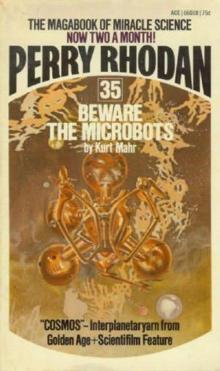 Beware the Microbots
Beware the Microbots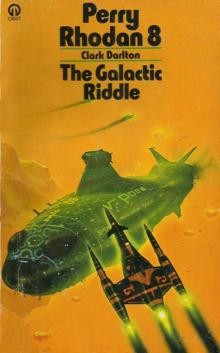 The Galactic Riddle
The Galactic Riddle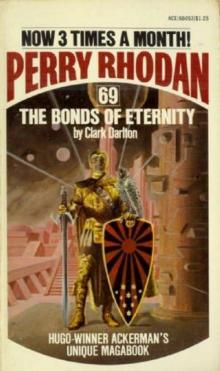 The Bonds of Eternity
The Bonds of Eternity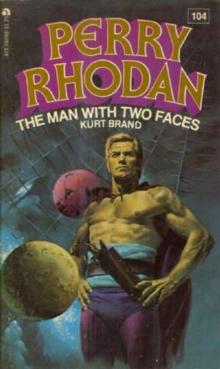 The Man With Two Faces
The Man With Two Faces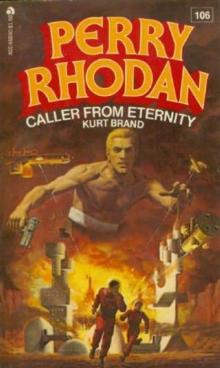 Caller from Eternity
Caller from Eternity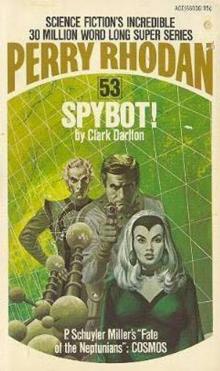 Spybot!
Spybot!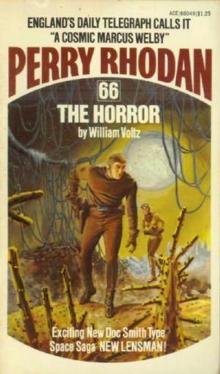 The Horror
The Horror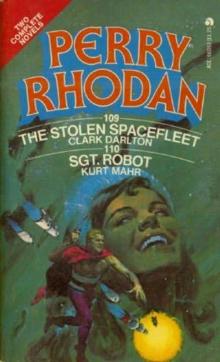 The Stolen Spacefleet
The Stolen Spacefleet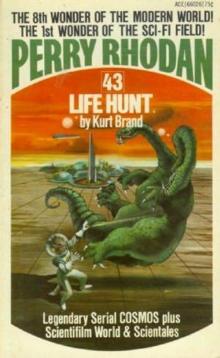 Life Hunt
Life Hunt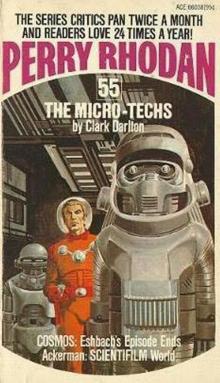 The Micro-Techs
The Micro-Techs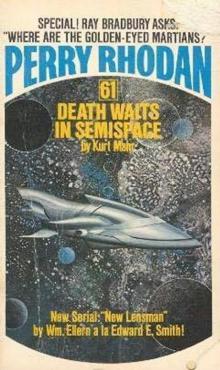 Death Waits in Semispace
Death Waits in Semispace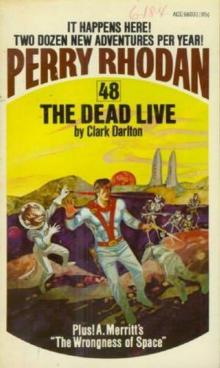 The Dead Live
The Dead Live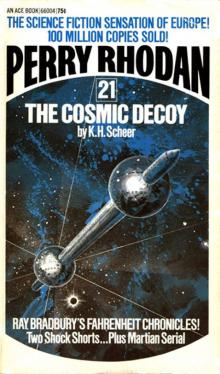 The Cosmic Decoy
The Cosmic Decoy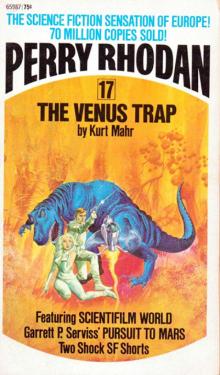 The Venus Trap
The Venus Trap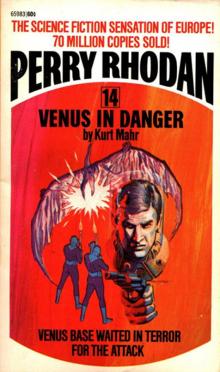 Venus in Danger
Venus in Danger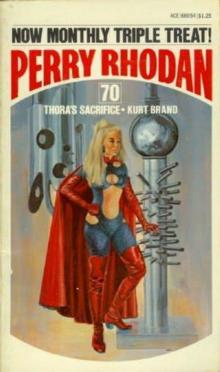 Thora's Sacrifice
Thora's Sacrifice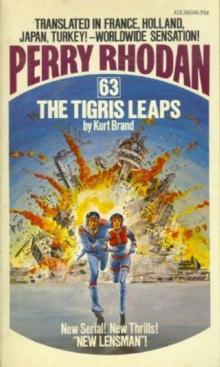 The Tigris Leaps
The Tigris Leaps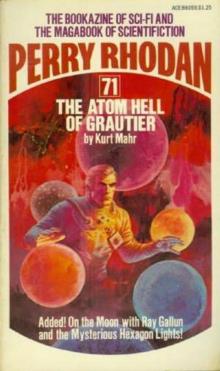 The Atom Hell of Grautier
The Atom Hell of Grautier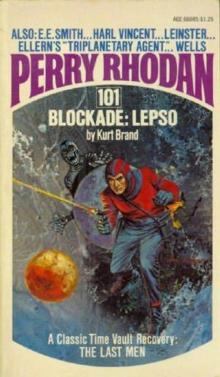 Blockade: Lepso
Blockade: Lepso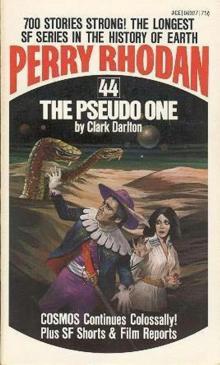 The Pseudo One
The Pseudo One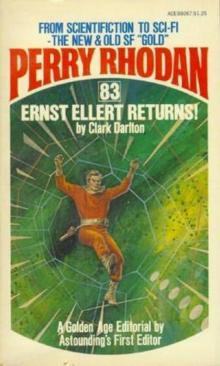 Ernst Ellert Returns
Ernst Ellert Returns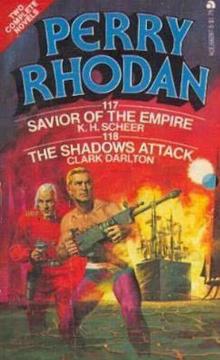 Savior Of The Empire
Savior Of The Empire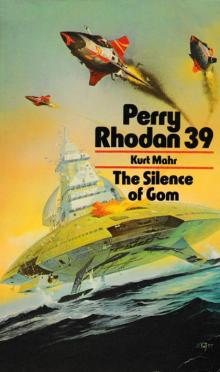 The Silence of Gom
The Silence of Gom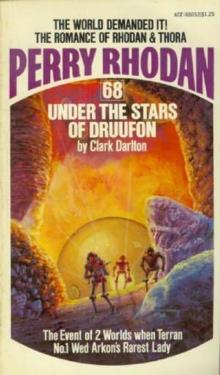 Under the Stars of Druufon
Under the Stars of Druufon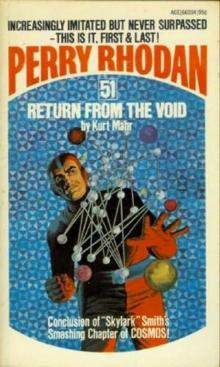 Return from The Void
Return from The Void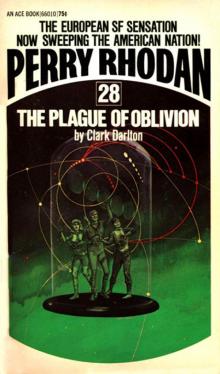 The Plague of Oblivion
The Plague of Oblivion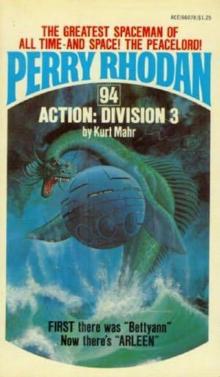 Action Division Three
Action Division Three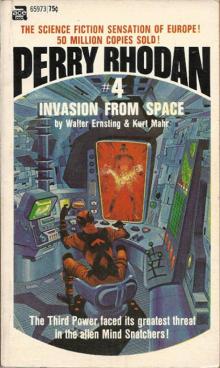 Invasion From Space
Invasion From Space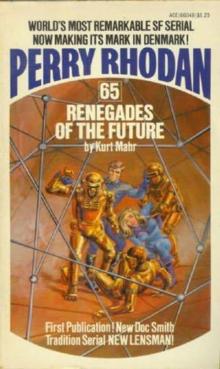 Renegades of the Future
Renegades of the Future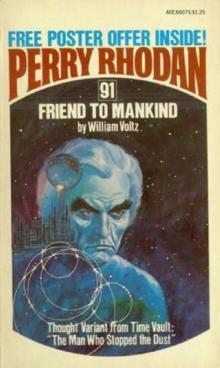 Friend to Mankind
Friend to Mankind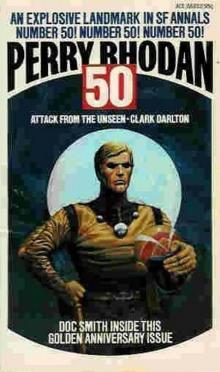 Attack from the Unseen
Attack from the Unseen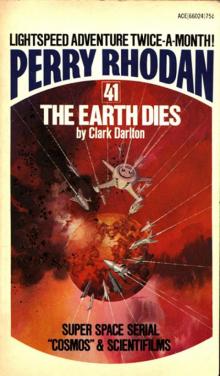 The Earth Dies
The Earth Dies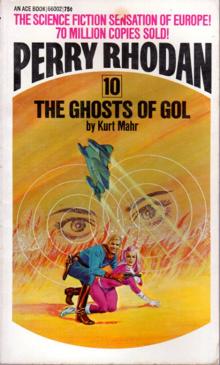 The Ghosts of Gol
The Ghosts of Gol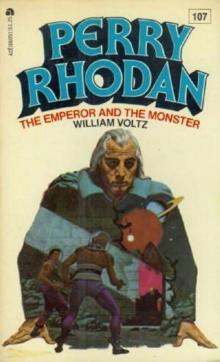 The Emperor and the Monster
The Emperor and the Monster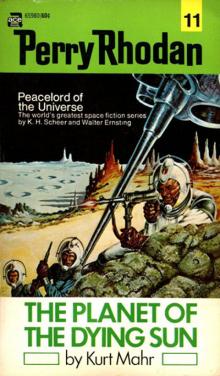 The Planet of the Dying Sun
The Planet of the Dying Sun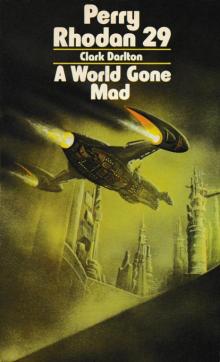 A World Gone Mad
A World Gone Mad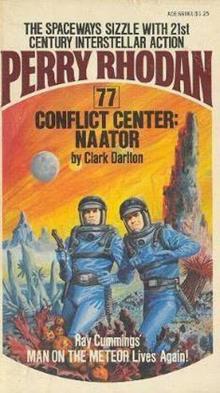 Conflict Center Naator
Conflict Center Naator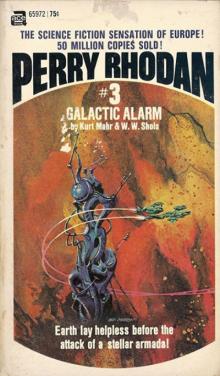 Galactic Alarm
Galactic Alarm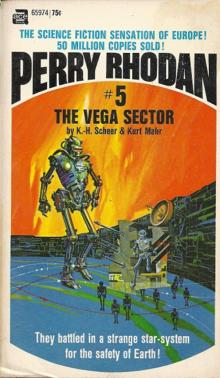 The Vega Sector
The Vega Sector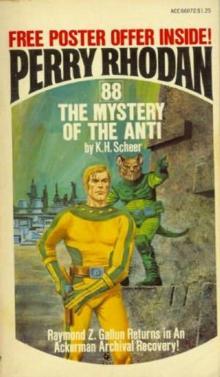 Mystery of the Anti
Mystery of the Anti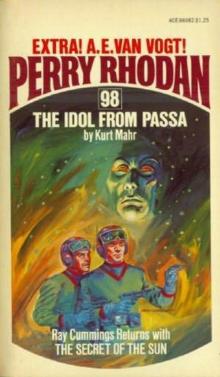 The Idol from Passa
The Idol from Passa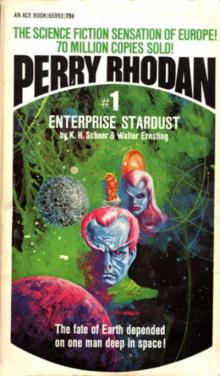 Enterprise Stardust
Enterprise Stardust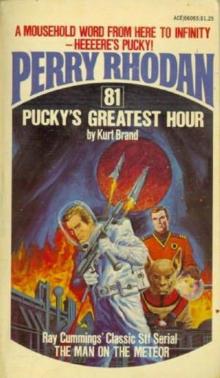 Pucky's Grestest Hour
Pucky's Grestest Hour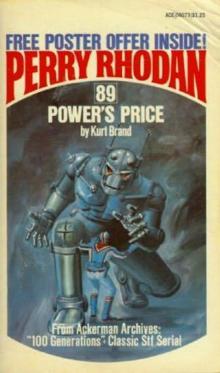 Power's Price
Power's Price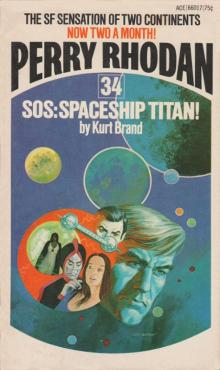 SOS Spaceship Titan
SOS Spaceship Titan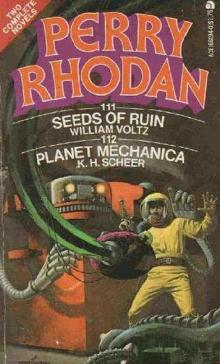 Seeds of Ruin
Seeds of Ruin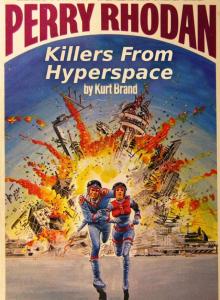 Killers From Hyperspace
Killers From Hyperspace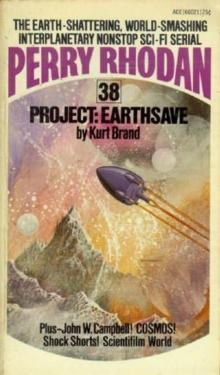 Project Earthsave
Project Earthsave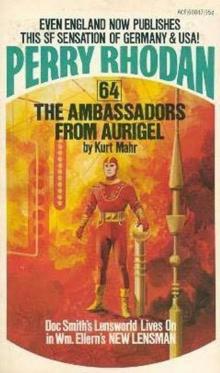 The Ambassadors from Aurigel
The Ambassadors from Aurigel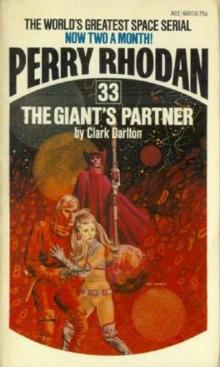 The Giant's Partner
The Giant's Partner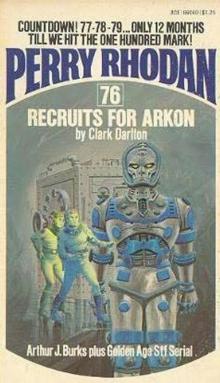 Recruits for Arkon
Recruits for Arkon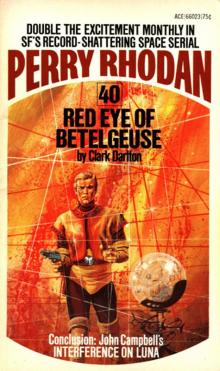 Red Eye of Betelguese
Red Eye of Betelguese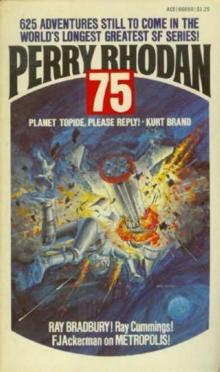 Planet Topide Please Reply
Planet Topide Please Reply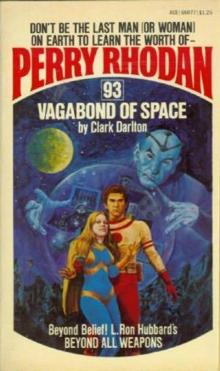 Vagabond of Space
Vagabond of Space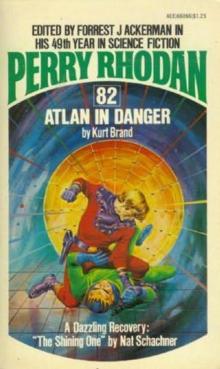 Atlan in Danger
Atlan in Danger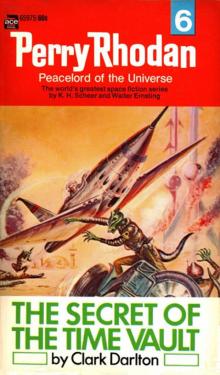 The Secret of the Time Vault
The Secret of the Time Vault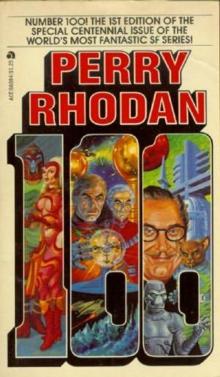 Desert of Death's Domain
Desert of Death's Domain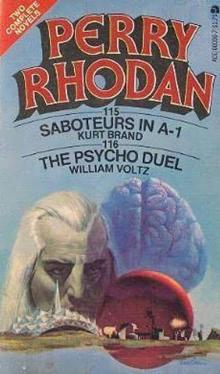 Saboteurs in A-1
Saboteurs in A-1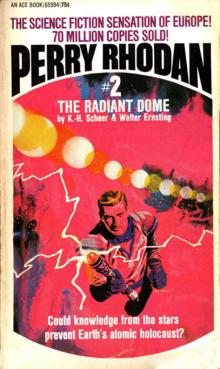 The Radiant Dome
The Radiant Dome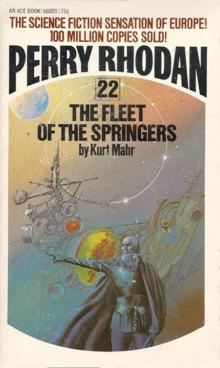 The Fleet of the Springers
The Fleet of the Springers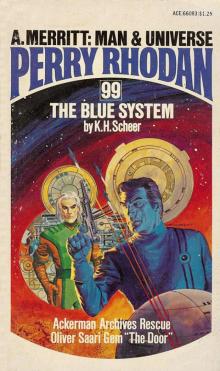 The Blue System
The Blue System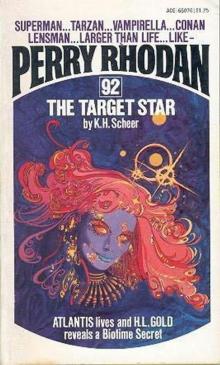 The Target Star
The Target Star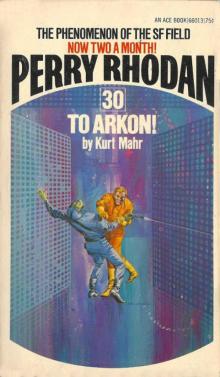 To Arkon!
To Arkon!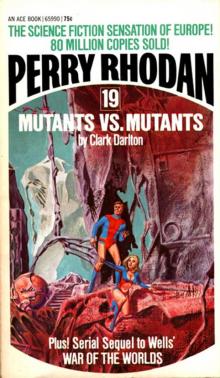 Mutants Vs Mutants
Mutants Vs Mutants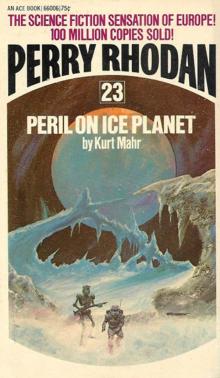 Peril on Ice Planet
Peril on Ice Planet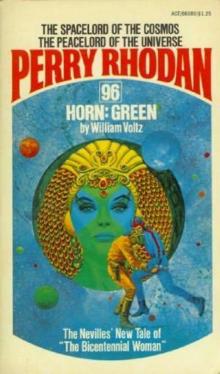 Horn: Green
Horn: Green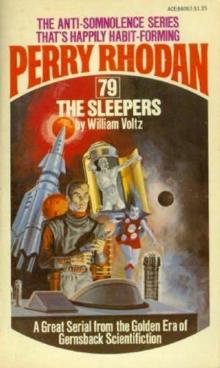 The Sleepers
The Sleepers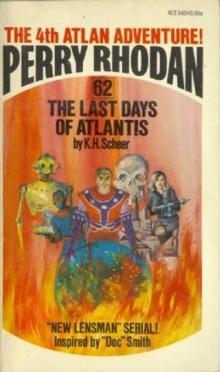 The Last Days of Atlantis
The Last Days of Atlantis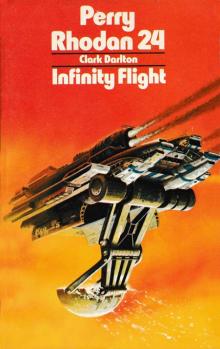 Infinity Flight
Infinity Flight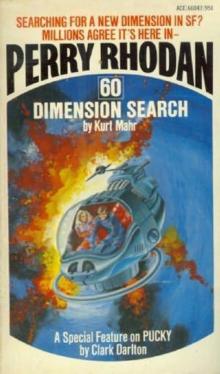 Dimension Search
Dimension Search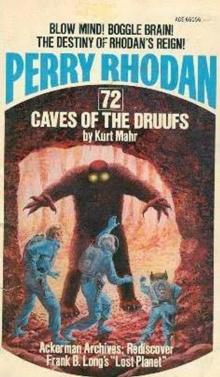 Caves of the Druufs
Caves of the Druufs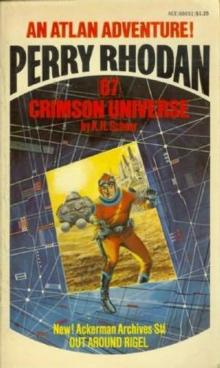 Crimson Universe
Crimson Universe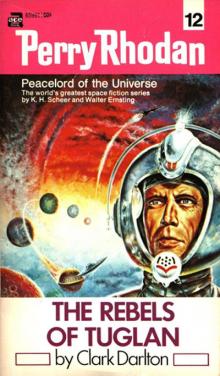 The Rebels of Tuglan
The Rebels of Tuglan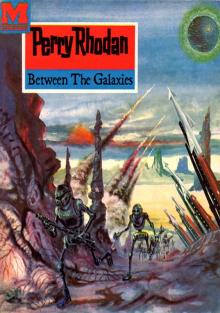 Between The Galaxies
Between The Galaxies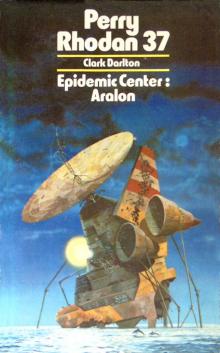 Epidemic Center Aralon
Epidemic Center Aralon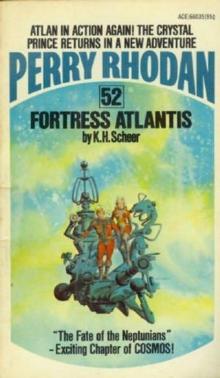 Fortress Atlantis
Fortress Atlantis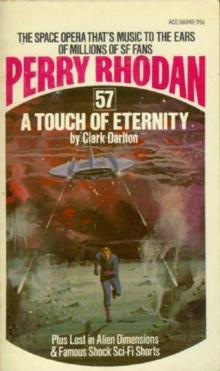 A Touch of Eternity
A Touch of Eternity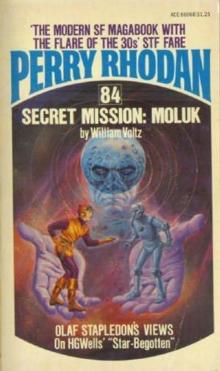 Secret Mission Moluk
Secret Mission Moluk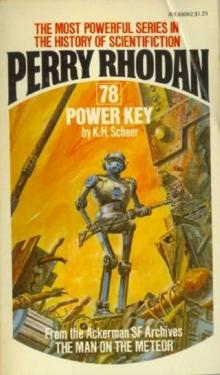 Power Key
Power Key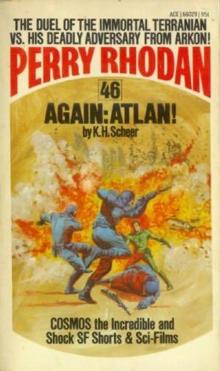 Again Atlan
Again Atlan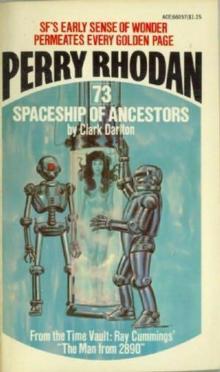 Spaceship of Ancestors
Spaceship of Ancestors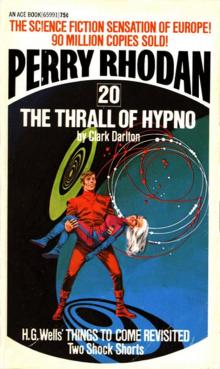 The Thrall of Hypno
The Thrall of Hypno